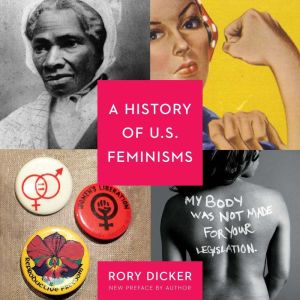

List: $24.98
| Sale: $17.49
Club: $12.49
A History of U.S. Feminisms
Author: Rory C. Dicker
Narrator: Lessa Lamb
Unabridged: 6 hr 45 min
Format: Digital Audiobook Download
Publisher: Seal Press
Published: 07/13/2021
Categories: Nonfiction, History, Women, Social Science, Feminism & Feminist Theory, Women's Studies
Synopsis
The complete, authoritative, and up to date history of American feminism-intersectionality, sex-positivity
Updated and expanded, the second edition of A History of U.S. Feminisms is an introductory text that will be used as supplementary material for first-year women's studies students or as a brush-up text for more advanced students. Covering the first, second, and third waves of feminism, A History of U.S. Feminisms will provide historical context of all the major events and figures from the late nineteenth century through today.
The chapters cover: first-wave feminism, a period of feminist activity during the nineteenth and early twentieth centuries which focused primarily on gaining women's suffrage; second-wave feminism, which started in the '60s and lasted through the '80s and emphasized the connection between the personal and the political; and third-wave feminism, which started in the early '90s and is best exemplified by its focus on diversity, intersectionality, queer theory, and sex-positivity.
Updated and expanded, the second edition of A History of U.S. Feminisms is an introductory text that will be used as supplementary material for first-year women's studies students or as a brush-up text for more advanced students. Covering the first, second, and third waves of feminism, A History of U.S. Feminisms will provide historical context of all the major events and figures from the late nineteenth century through today.
The chapters cover: first-wave feminism, a period of feminist activity during the nineteenth and early twentieth centuries which focused primarily on gaining women's suffrage; second-wave feminism, which started in the '60s and lasted through the '80s and emphasized the connection between the personal and the political; and third-wave feminism, which started in the early '90s and is best exemplified by its focus on diversity, intersectionality, queer theory, and sex-positivity.